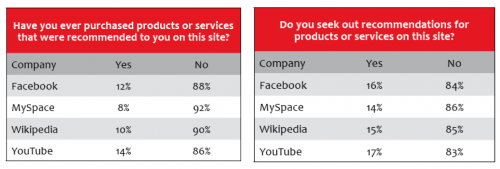Study: “Facebook Flops, Google Drops” In New Consumer Satisfaction Ratings
That’s the headline Foresee Results, which administers the e-business portion of the American Consumer Satisfaction Index (ACSI), used to get attention from reporters and bloggers. This is the first year that the survey, which tracks general consumer satisfaction levels with websites, has measured social media. What the company found was that the ad hoc collection […]
That’s the headline Foresee Results, which administers the e-business portion of the American Consumer Satisfaction Index (ACSI), used to get attention from reporters and bloggers. This is the first year that the survey, which tracks general consumer satisfaction levels with websites, has measured social media.
What the company found was that the ad hoc collection of social media sites in the new social media category “debuted with an ACSI score of 70, well below portals & search engines and news & information sites.”
The survey looked at Wikipedia, YouTube, Facebook, MySpace and “all others.” Twitter wasn’t included apparently because so much of Twitter’s access comes from third party clients. As mentioned the category average was 70. Facebook scored a 64, while YouTube scored a 73. The generic “all others” received a 72 mysteriously.
Source: Foresee Results (7/10)
In explaining Facebook’s relatively low score Forsee Results said the following:
When asked what they like least about Facebook survey respondents gave answers including privacy and security concerns, the technology that controls the news feeds, advertising, the constant and unpredictable interface changes, spam, navigation troubles, annoying applications with constant notifications, and functionality, to name a few. There is no shortage of complaints about Facebook.
Forsee Results found that satisfaction varied by age, as one might expect:
Older people are less satisfied with Facebook than are younger people, who are less impacted by the privacy concerns and changes to the interface. Young people helped to make Facebook successful, and they like it a little better. However, the fastest-growing Facebook segments are all older adults, so higher satisfaction among young people will not carry the company far.
Sure, this is interesting but what’s at stake with these scores? Forsee Results argues that ACSI scores are predictors of future success:
Customer satisfaction as measured using the American Customer Satisfaction Index (ACSI) is a proven predictor of financial performance. Academic research and corporate experience shows that satisfied customers are more loyal, more likely to engage in positive word-of-mouth recommendations, and more likely to buy in the future . . .
Simply put, there is no better metric for predicting business success than the ACSI, which is why ForeSee Results uses the ACSI methodology for our clients and why we partner with the ACSI to review and analyze this data.
Yet that has not always proven to be correct, as in the case of Google.
In 2007 the ACSI results saw Yahoo jump ahead of Google in satisfaction ratings for the first time since the inception of the e-business survey. This was supposed to be predictive of future market share gains for Yahoo:
[Foresee Results CEO Larry] Freed . . . [said] that “search market share reflects past behavior. But the ACSI is predictive of future consumer behavior.” He said that historically it has been a very accurate gauge of future consumer behavior in other industries. He added that Google’s decline was a second dip in a row after a smaller decline last year.
But Yahoo didn’t gain market share; Google continued to gain and the company’s satisfaction scores rebounded the following year. Over the life of the survey, however, satisfaction scores have been correlated with success. So it’s best to look at longer-term trends rather than jump to conclusions based on the isolated survey data of any single year.
With that caveat we can get into the search-satisfaction data for 2010.
This is the first time that Bing has been measured in the survey. It came in ahead of Yahoo but behind Google, which fell an “incredible six points and 7% this year, matching its lowest score ever in 2002.”
Here are search satisfaction trends for the past five years:
Source: data Foresee Results (7/10)
Foresee Results speculates about Google’s decline in the following way:
Google may be suffering from trying to be too many things to too many people, as is evidenced by the superior performance of the All Others category with its niche players. In fact, when asked what they like least about Google, survey respondents commonly mentioned issues like advertising, overwhelming search results, privacy concerns, and too many special features (like maps and shopping).
The “all others” category included “niche websites like Dogpile, GoodSearch, MyPoints, and Swagbucks.” That group collectively scored higher than Google, Yahoo and Bing. This suggests what may be another important variable or factor underlying the scores: consumer expectations.
Consumers expect a great deal from Google and they probably expect relatively little by comparison from the individual sites and engines in the “all others” category. Those same expectations confront Google’s main competitors, which it outscored. So even though Bing did well Google still beat it.
The ACSI scores may thus say more about the overall state of consumer expectations toward search than they do about any site in particular.
Contributing authors are invited to create content for Search Engine Land and are chosen for their expertise and contribution to the search community. Our contributors work under the oversight of the editorial staff and contributions are checked for quality and relevance to our readers. The opinions they express are their own.
Related stories


